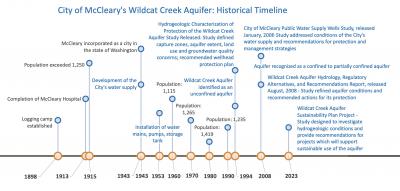Wildcat Creek Aquifer Study
City of McCleary's Wildcat Creek Aquifer Sustainability Plan Project
In 2022, the city of McCleary (City) initiated the Aquifer Sustainability Plan (ASP) project in response to concerns over groundwater quality and quantity in the Wildcat Creek Aquifer. The aquifer is the City's only source of reliable drinking water and supports most other users in the basin. The Department of Ecology has closed Wildcat Creek between May 1 and October 31 by rule, meaning no water is available for appropriation from the creek and no unmitigated consumptive groundwater use should be approved that captures water from the creek during the closed period. To address long-term use and protection of the aquifer, McCleary developed the ASP project as a framework to achieve long-term reliability over a 20-year horizon.
The ASP project brings together a variety of stakeholders to design a conjunctive use strategy to manage groundwater and surface water in the basin. The first phase of the ASP project included updating our current knowledge of aquifer conditions, working with the community to understand concerns and issues related to water resources, and to propose water management considerations and project management actions to promote aquifer sustainability.
Community Outreach
Community outreach efforts included forming an ASP Board which involved recruiting concerned citizens, including a member supporting habitat restoration interests, and county and local officials. The ASP board was instrumental in communications about the project to the community. This allowed for stakeholders to relay personal experiences and stories with respect to water use in basin and to express concerns over the future use of the aquifer. To provide a conduit for communication, an ASP website was created on the City’s webpage, with a survey posted to allow users to anonymously submit comments. The survey produced 34 responses, mostly competed by residents within city limits. The majority of survey responses showed a high degree of concern over water supply.
Additional Links and Resources

